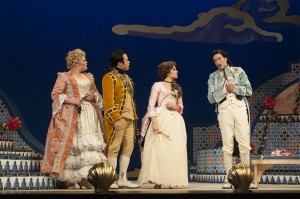More than 150 years ago, “I Due Figaro” by Saverio Mercadante vanished from the opera scene.
On Friday, Opera UCLA will perform the West Coast premiere of the Italian opera in collaboration with the School of Theater, Film and Television’s theater department and the Herb Alpert School of Music.
Originally written in 1826, “I Due Figaro” was not performed for another 10 years because of conflict between the lead soprano and the composer. By this time, tastes had shifted and the opera quickly fell off the radar, said Peter Kazaras, director of “I Due Figaro” and director of opera studies at the Herb Alpert School of Music. The manuscript of the opera was discovered in 2009, and the first modern production was performed two years later at the Ravenna Festival in Italy.
The show will feature an orchestral performance by UCLA Philharmonia, with guest conductor Joseph Colaneri from Mannes College the New School for Music, while the work of students from the School of Theater, Film and Television will be showcased in the lighting, costume and set design. Kazaras said collaboration with the Department of Theater is something he hoped to foster since he arrived in UCLA.
“It is my absolute pleasure to collaborate with them on (design) and to make sure their students get that (experience),” Kazaras said.
“I Due Figaro” is one of many operas following the clever servant Figaro and his family, who are characters from the plays of 18th-century French playwright Pierre Beaumarchais. Usually one step ahead of others, Figaro, in “I Due Figaro,” is ultimately a step behind his even sharper wife, Kazaras said.
“In some fairy tales, it ends with a kind of ‘and they got married and lived happily ever after,'” Kazaras said. “Well, this kind of Italian comedy starts because two people get married, and that is, by definition, always fraught.”
In addition to “I Due Figaro,” Opera UCLA has also performed the West Coast premieres of Francesco Cavalli’s “Giasone” and Jonathan Dove’s “Flight” in 2010. This rendition of “I Due Figaro” is also part of the Los Angeles-wide celebration of Beaumarchais’ characters, called “Figaro Unbound,” which will feature performances by the L.A. Opera and other groups.
Third-year vocal performance student Gregory Sliskovich, who sings the principle role of Don Alvaro, said being associated with the L.A. Opera in the Figaro plays is a huge honor.
“It’s exciting to know our project is not just at home, at UCLA, but that it’s got this citywide spectrum to it,” Sliskovich said.
Kazaras said he decided to have Opera UCLA perform “I Due Figaro” because he thought the score would be stimulating for his students.
“It’s tough but it’s good, and you will hear some amazing singing. … Quick notes, passage work, coloratura singing and (the performers) are capable of doing it,” Kazaras said.
Terri Richter, a graduate student who plays the leading role of Figaro’s wife Susanna, said she enjoys the strong personality she portrays.
“She’s sort of forward thinking and doesn’t accept the restrictions that … society puts on women,” Richter said. “She’s intelligent and speaks her mind.”
Sliskovich said he feels that Opera UCLA’s performance is a niche project because “I Due Figaro” is relatively unknown on the West Coast.
“I can’t say I’ve ever sung anything like Mercadante’s ‘I Due Figaro,'” Sliskovich said. “It’s a comedy with a lot of funny moments, great music and is just a great listen.”
Sliskovich is one of the few undergraduates with a principal role and is performing alongside a group of mainly graduate students. Beginning opera studies at UCLA as a baritone, he later switched to tenor and has been slowly transitioning toward tenor roles, Kazaras said.
“It’s like the equivalent of weightlifting – you have to do a little more (than) you are immediately comfortable but over the rehearsal period he has become comfortable with it and he’s great,” Kazaras said. “He was the person I knew from the undergrads who could handle this.”
Viewing the graduate students as teachers, Sliskovich said he finds working among them to be enriching.
“It’s definitely a huge honor to be trusted with learning, preparing and performing a role for the main stage opera for the year,” Sliskovich said. “To see how (the graduate students) prepare and move and sing (is) amazing. … I couldn’t ask for a better experience as an undergraduate.”
Kazaras said “I Due Figaro” holds something relatable in the behaviors and reactions that the characters experience, even for those who aren’t fans of opera.
“It has to do with our essential humanity, in that we are blinded by desire, we are blinded by emotion,” Kazaras said. “Those things get in our way of having an honest and rational reaction to what is going on, and that to me is extremely human, and therefore extremely funny.”
